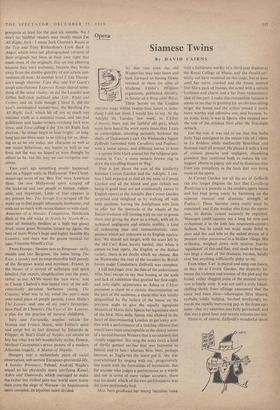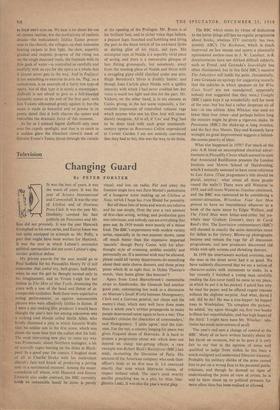Opera
Siamese Twins
By DAVID CAIRNS AT this rate even the old Wagnerites may take heart and look forward to having Grane restored to them (in stAte of Madame Leider's ilfRitient arguments, published retaily, in favour of a Ring ohnd Ross).
Three horses on the London operatic stage within twenty-four hours is some- thing I .did not think I would live to see. At the Adelphi on Tuesday last week, in L'Elisir d'Amore, there was the faithful old grey, which must have heard the work more times than I care to contemplate, standing patiently between the shafts of Dulcamara's cart. On Wednesday Signor Zeflirelli furnished both Cavalleria and Pagliacci with a horse apiece, and different horses to boot —a spruce little black animal for the religious pro- cession in 'Cav,' a more modest brown nag to draw the travelling theatre in 'Pag.'
That is just about the sum of the similarity between Covent Garden and the Adelphi. I con- fess I had expected to find all the taste at Covent Garden and all the blood and guts (which not being in good taste are not traditionally native to English opera) at the Adelphi. But Covent Garden surprised and delighted us by walking off with both qualities, leaving the Adelphians with little to offer but the spectacle of the wheels of the Italian tradition still turning with no one to grease them and giving the show as a whole, with all its technical negligence and artistic senility, a kind of redeeming ease and somnambulistic com- petence which are unknown to its English equiva- lent. We should not forget, with the scars left by the old Carl Rosa barely healed, that when it comes to bad opera, the English or the Italian variety, there is no doubt which we choose. But on Wednesday the rout of the invaders by British forces under Condottiere Zeffirelli was complete.
I will not linger over the fate of the unfortunate Miss Neri except to say that booing of the scale and lack of inhibition that greeted her first-night, and only-night, appearance as Adina in L'Elisir presumes a claim to a certain discrimination on the part of the audience, a claim that was totally disqualified by the failure of the house on the previous night to give the equally egregious Musetta of Maria della Spezia her legitimate share of the bird. Miss della Spezia was allowed in the heart of discriminating London to get away scot- free with a performance of a tinkling silliness that would have been unacceptable in the sleazy saloon 'of a second-feature Western that it so curiously but vividly suggested. She sang the notes (with a kind of shrilly genteel tee-hee that was fearsome to behold and to hear) whereas Miss Neri, perhaps because, as Tagliavini the tenor put it, 'she was overwhelmed by singing with me,' progressively lost touch with the formalities of intonation. But for anyone who judges a performance as a whole and not in terms of mere vulgar accuracy, there was no doubt which of the two performances was the more profoundly bad.
Miss Neri produced her weeny harmless voice with a feebleness worthy of a third-year student at the Royal College of Music, and she should cer- tainly not have ventured on this stage; but at least until her nerve cracked and the house scented I feat like a pack of hyenas, she acted with a certain ' 'freshness and charm and a far from rudimentary idea of the part. I make this comparison because it seems to me that in gunning for an obvious sitting target the house and the critics missed a much more worthy and offensive one, and because, by an ironic twist, it was la Spezia who stepped into the role of the stricken Neri after the first-night debacle.
For the rest, it was sad to see that fine buffo halo Tajo consigned to the minor role of Colline in La Bohenze while mediocrity flourished and flaunted itself all around. He played it with a kind of cynical panache and negligent, shambling grandeur that contrived both to reduce his col- leagues' efforts to pigmy size and to dissociate him from any complicity in the hash that was being made of the opera.
At Covent Garden not all the art of Zeffirelli can any longer disguise the fact that Cavalleria Rusticana is a parasite in the modern opera house and has kept going solely by battening on the superior musical and dramatic strength of Pagliacci. These Siamese twins really must be separated; and if the weaker dies from the opera- tion, its demise cannot seriously be regretted. Mascagni could squeeze out a long fat tune and orchestrate it in the lush late nineteenth-century fashion, but he could not write music fitted in pace and fire and bite to the naked drama of a peasant crime passionnel in a Sicilian village. His orchestra, weighed down with motives heavily 'significant' of this and that, and made to bear far too large a share of the dramatic burden, hardly ever has anything sufficiently pithy to say.
Even when 'Cm,' is played and sung con fuoco, as they do at Covent Garden, the disparity be- tween the violence and tension of the plot and the broad, rather sluggish pulse of the musical inven- tion is fatally wide. It was not until a truly blood- chilling shriek from offstage announced that the tenor had been slain—whereupon Miss Shuard, eyeballs wildly bulging, lurched terrifyingly to- wards the rapidly narrowing gap in the front cur- tains—that my attention was fully galvanised; and that was a good hour and twenty minutes too late.
There is, of course, Zeffirelli's wonderful decor to feast one's eyes on. We hear a lot about his use of cinema realism; but the multiplicity of realistic details—the meticulously lifelike Easter proces- sion to the church, the villagers on their balconies beating carpets at first light, the slow, superbly gradual and majestic progress of the rising sun on the rough stuccoed roofs, the fountain with its thin gush of water—is controlled so carefully and tactfully with an eye for the opera as a whole that it almost never gets in the way. And in Pagliacci it has something to exercise its arts on. 'Pag,',as a melodrama, is an example of a fairly low type of opera, but of that type it is surely a masterpi,eFe. Zeflirelli is not afraid to give us a full-blooded romantic sunset at the end of the first part, with Jon Vickers silhouetted grimly against it; but the scene is made so beautiful and so precise in its poetic detail that it both charms the senses and redoubles the dramatic force of this moment.
As far as I noticed Signor Zeffirelli only once uses the cupola spotlight, and that is to catch in a sudden glare the blanched clown's mask of Geraint Evans's Tonio, thrust through the curtain
at the opening of the Prologue. Mr. Evans is at his brilliant best, and in richer voice than before, a peasant lago, hunched and hobbling and living the part to the finest twitch of his awkward limbs or darting glint of his black, sad eyes. His attempted rape of Nedda is a superbly vivid piece of acting, and there is a memorable glimpse of him flitting grotesquely, but noiselessly, away from the meeting place of Nedda and Silvio with a struggling gipsy child clutched under one arm. Hugh Beresford's Silvio is frankly feeble; and though Joan Carlyle plays Nedda with a spitfire intensity with which I had never credited her, her voice is much too light and thin for the part. Mr. Vickers, on the other hand, is in his element as Canio, giving, in the last scene especially, a for- midable impression of controlled volcanic rage which anyone who saw his Don Jose will imme- diately recognise. All in all, if 'Cav' and Tag' had to be done (and with such great nineteenth- century operas as Ben venuto unproduced at Covent Garden I am not entirely convinced that they had to be), this was the way to do them.



























 Previous page
Previous page